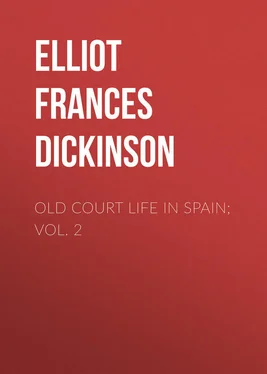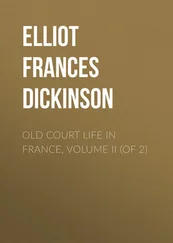Frances Elliot - Old Court Life in Spain; vol. 2
Здесь есть возможность читать онлайн «Frances Elliot - Old Court Life in Spain; vol. 2» — ознакомительный отрывок электронной книги совершенно бесплатно, а после прочтения отрывка купить полную версию. В некоторых случаях можно слушать аудио, скачать через торрент в формате fb2 и присутствует краткое содержание. Жанр: foreign_antique, foreign_prose, на английском языке. Описание произведения, (предисловие) а так же отзывы посетителей доступны на портале библиотеки ЛибКат.
- Название:Old Court Life in Spain; vol. 2
- Автор:
- Жанр:
- Год:неизвестен
- ISBN:нет данных
- Рейтинг книги:3 / 5. Голосов: 1
-
Избранное:Добавить в избранное
- Отзывы:
-
Ваша оценка:
- 60
- 1
- 2
- 3
- 4
- 5
Old Court Life in Spain; vol. 2: краткое содержание, описание и аннотация
Предлагаем к чтению аннотацию, описание, краткое содержание или предисловие (зависит от того, что написал сам автор книги «Old Court Life in Spain; vol. 2»). Если вы не нашли необходимую информацию о книге — напишите в комментариях, мы постараемся отыскать её.
Old Court Life in Spain; vol. 2 — читать онлайн ознакомительный отрывок
Ниже представлен текст книги, разбитый по страницам. Система сохранения места последней прочитанной страницы, позволяет с удобством читать онлайн бесплатно книгу «Old Court Life in Spain; vol. 2», без необходимости каждый раз заново искать на чём Вы остановились. Поставьте закладку, и сможете в любой момент перейти на страницу, на которой закончили чтение.
Интервал:
Закладка:
Frances Minto Dickinson Elliot
Old Court Life in Spain; vol. 2/2
CHAPTER I
Fiesta of the Corpus Domini
THE time is early summer; the sky an unbroken sphere of blue, as deep and smooth as a turquoise, canopying the blanched domes and pinnacles of the cathedral and illuminating with ineffable splendour the elegant galleries of the Giralda tower. No shade anywhere, on plaza, patio , or river bank; nothing but a blazing sun, making golden motes; the thinly leaved palms scarcely leaving a reflection on the hot earth.
It is the Fiesta of the Corpus Domini. The whole city of Seville is astir, the procession is passing, Don Pedro following bareheaded, attended by Don Juan de Mañara, Ferran de Castro, Don Garcia Padilla, and many others, under a gorgeous canopy, and so delicately fair and flaxen-haired does he look, he is more like a young saint than a king.
Behind him walk the archbishop wearing a jewelled mitre, and the chapter in rich copes and robes, followed by the knights of the military orders of Santiago and Calatrava, the cross upon their breasts, armed cap-à-pie , with nodding plumes, each knight with his flag and cognisance borne by page and esquire; a magnificent procession, set off by the sombre background of monks, penitents, choristers, and chanting canons intoning the offices of the Church.
Now all who have seen a religious procession in Spain will understand the splendour of it. The mediæval magnificence of the robes, wrought in plaques of solid gold and incrusted with priceless jewels, the brilliant glow of sacred banners, the sheen of the steel caps and armour; and above all the amazing glitter of the gigantic dolls (or pasos ), larger than life, dressed in the most gorgeous robes, representing the Saviour, the Virgin, and saints and martyrs. To the sound of trumpets, drums, and cymbals they advance in a blaze of tapers and torches, carried on platforms of wood, through the narrow streets, over which silken awnings are drawn from house to house, every soul present, from the king down to the last of los pobres , prostrate on the stones.
The Virgin first, diamond-crowned, of gigantic height, with deep-set glassy eyes, one big hand ablaze with rings, raised in benediction; San Fernando, habited in steel, his helmet raised to display his glistening visage, his royal mantle sewn with the emblem of the Nodo of Castile and Leon; the local saints, Justina and Rufina, who, refusing to worship the Phœnician idol Salambo in her temple in Triana, suffered martyrdom; San Tomas and San Lazarus, and the imaginary Santiago, as a heavenly knight, Protector of Spain, clad in the white mantle of his order, a broadsword by his side, and a glory round his casque, carrying the baton of command.
From the balconies and the miradores float damask draperies, striped Moorish stuffs, and wreaths of feathers and flowers; fans wave incessantly in the heavy air, and long black mantillas fall over eyes lustrous under meshes of coal black hair – to the wild ringing of every bell in the city, led by the boom of the Giralda, and petards exploding as of a city taken by assault.
As the procession passes the stone balcony of the Palacio del Ayuntamiento, Don Pedro’s mistress, Maria de Padilla, flashes forth, a dark vision of beauty, crowned with a regal circlet as though she were a queen, by her side her little son Alonso, dark-eyed as she is herself.
Such a sight causes the archbishop to tremble lest a speedy judgment should follow on himself. Yet, spite of the chanting and the prayer, the sacred pasos with their hard unearthly eyes reflecting, as it were, the horror expressed by the archbishop, Don Pedro at once arrests the procession, and with a gracious gesture signs to Maria to descend and take her place beside him. And so godless is he in the eyes of all men, he would insist, but for the confusion which ensues by the sudden stopping of such a crowd and the screaming and cries of those who were pressed together, – when, in the confusion, the glove which he carries in his hand, worked with the arms of Castile, drops on the ground.
Don Juan de Mañara, who is nearest to Don Pedro, rushes to pick it up, but is forestalled by one of the chapter, a stalwart young priest, by name Don Jaime de Colminares. As he is in the very act, on bended knee, of returning the glove, a youth all aflame with passion rushes forth and stabs him in the breast.
A gleam, a cry, a quiver, and all is over. Not a voice is raised, not a hand stirs. Even the archbishop is mute in presence of the king, but his pallid face and the terrified glances of the chapter say more than words.
Not so Don Pedro, who stamps his foot with wrath as he faces the assassin, the least moved among them all.
“Who are you?” asks the king, his voice trembling with rage, “who dare to assume my prerogative of life and death?”
“My name, my lord, is Emanuel Perez,” is the prompt answer as he meets Don Pedro’s furious glance with honest eyes.
“Why have you killed this man?” demands the king, maddened at his coolness, his hand on the hilt of a wrought dagger at his waist, while the archbishop and the chapter draw round to listen.
“My lord,” answers Emanuel, falling on his knees, for the majesty of the king has subdued him, “I had my reasons. Ask me not to speak evil of dignitaries,” and he gazes round at the rampart of glaring eyes.
“Speak,” answers the king; “the dead is silent, the living man must tell the tale. Speak, or tortures shall make you. Were it even myself you had to accuse, I command you, speak. The crime is public, so shall be the punishment. I live before my people.”
Cries of “Castila! Castila!” come from the excited crowd. Caps are flung in the air and loud vivas! come from the beggars and ruffians of the street.
Behind Don Pedro rises the Moorish arch of the Puerta del Perdon, a sheet of delicate carving, white as snow, framing his figure as in a picture. Above rises the cathedral, a gigantic pile of richly carved cornices and tier above tier of carved parapets and domes, the walls ornamented with innumerable niched figures, bosses, roses, and stars. On one side of the street lies the murdered priest in his sacerdotal robes, the painted dolls on the other, the stately form of the archbishop between, his hands folded, his eyes cast down in prayer, the affrighted chapter gathering about him in purple robes, and behind the populace eagerly pressing round the king.
Then Emanuel speaks: “Sire, my father is a zapatero (shoemaker); I follow the same trade. We are poor but honest, no one reviles us. My lord, I had a sister,” as the word passes his lips he quivers all over, and looking down on the canon’s blood, which has made for itself a little runnel among the stones, he savagely stamps on it, while at the word “sister” a cynical smile passes over the king’s lips and the majesty of his attitude relaxes.
“She was hermosa ,” continues Emanuel, not noticing the change, “ muy hermosa . Every one looked at her. She went to confession in the cathedral at the altar near the image of Santo Cristoforo, twice, three times – we could not think why she went so often – then she disappeared. We sought her everywhere, in the market, the stalls, the exchange, by the river, in the narrow alleys, and at the gates. No one had seen her. After some days her body was found in a deep ditch near the river. Then we knew the truth, and who had dealt with her. Of the foul deed and who had done it we spoke. Three days after, my father’s body was brought to us, stabbed to the heart. Then, upon the wounds of Christ, I swore an oath to kill the beast who wore the robe of God to defile it, and I have kept my word.”
Читать дальшеИнтервал:
Закладка:
Похожие книги на «Old Court Life in Spain; vol. 2»
Представляем Вашему вниманию похожие книги на «Old Court Life in Spain; vol. 2» списком для выбора. Мы отобрали схожую по названию и смыслу литературу в надежде предоставить читателям больше вариантов отыскать новые, интересные, ещё непрочитанные произведения.
Обсуждение, отзывы о книге «Old Court Life in Spain; vol. 2» и просто собственные мнения читателей. Оставьте ваши комментарии, напишите, что Вы думаете о произведении, его смысле или главных героях. Укажите что конкретно понравилось, а что нет, и почему Вы так считаете.












